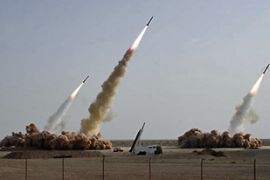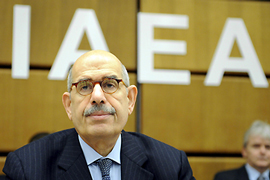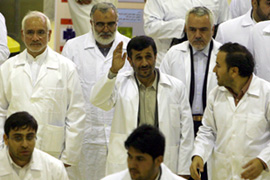Report: Iran can make nuclear bomb
UN watchdog, the IAEA, says “no concrete proof” of claims made in leaked document.

The AP said the classified document, titled Possible Military Dimension of Iran’s Nuclear Programme, appeared to be a “secret annex” – detailing evidence of Iranian nuclear “weaponisation” that the US, France, Israel and other IAEA members say is being withheld by agency chief Mohamed ElBaradei – claims the UN nuclear watchdog denies.
Iran’s ‘deterrent’
The document traces Iran’s nuclear arms ambitions as far back as 1984, when Ayatollah Ali Khamenei, the current supreme leader, was president and Iran was at war with Iraq.
| In depth | ||
|
|
At a high-level meeting at that time, according to the document, Khamenei endorsed a nuclear-weapons programme, saying “a nuclear arsenal would serve Iran as a deterrent in the hands of God’s soldiers”.
He and other senior Iranian leaders insist their country is opposed to nuclear weapons, describing them as contrary to Islam.
The revelation comes against the backdrop of a decision by President Barack Obama to scrap a previous administration’s plan for a missile defence shield in eastern Europe.
Robert Gates, the US defence secretary, said the decision came after US intelligence concluded that Iran’s short- and medium-range missiles were developing more rapidly than previously projected.
Therefore, he said, they now pose a greater near-term threat than the intercontinental ballistic missiles addressed by the plan under George Bush, the former US president.
Requests rebuffed
On the part of Iran, Mahmoud Ahmadinejad, the country’s president, has refused to rule out explicitly development of nuclear weapons and said in an interview with NBC News on Thursday that he would “never” halt Tehran’s work on peaceful nuclear programmes to appease Western sceptics.
He rebuffed repeated requests to affirm that there were no scenarios under which Tehran would develop nuclear weapons.
He said only that such weapons were “not a part of our programmes and plans” because “we don’t need such a weapon, without such weapons, we are very much able to defend ourselves”.
 |
| The IAEA says it has ‘no concrete proof’ of nuclear programme in Tehran [EPA] |
Ahmadinejad was adamant that he would not yield to pressure from the UN, the US and European governments to put an end to what he maintains are peaceful programmes, which have aggravated tensions and led to three sets of Security Council sanctions.
“If you are talking about the enrichment of uranium for peaceful purposes, this will never be closed down here in Iran,” he said.
The interview was conducted a week before Ahmadinejad’s scheduled address to the UN General Assembly, and two weeks before multilateral talks get under way on Iran’s nuclear programme, the first involving Iran since a 2008 session in Geneva foundered over its refusal to discuss its research on enriched uranium.
But Tehran says it is not prepared to discuss its nuclear activities.
Hillary Clinton, the US secretary of state, has said Iran must answer “head on” concerns about its nuclear programme at talks with world powers on October 1.
‘No concrete proof’
Responding to the AP report on Thursday, the IAEA did not deny the existence of a confidential record of its knowledge and assessment of Iran’s alleged attempts to make nuclear weapons.
But an agency statement said the IAEA “has no concrete proof that there is or has been a nuclear weapon programme in Iran”.
It cited ElBaradei as telling the agency’s 35-nation governing board last week that “continuing allegations that the IAEA was withholding information on Iran are politically motivated and totally baseless.”
 |
| Iran says not prepared to discuss its nuclear activities with world powers on October 1 [EPA] |
“Information from a variety of sources … is critically assessed by a team of experts working collectively in accordance with the agency’s practices,” it said.
“The IAEA reiterates that all relevant information and assessments that have gone through the above process have already been provided to the IAEA Board of Governors in reports of the director general.”
Diplomats close to the IAEA have told Reuters it has no “smoking gun” evidence of Iran currently trying to apply nuclear technology to its ballistic missile programme.
A diplomatic source close to the IAEA said the agency had no “secret annex” but did maintain a classified running analysis of its findings on Iran that, however, contained no final conclusions about Iran’s nuclear behaviour or ambitions.
“It’s a work in progress. It’s an assessment of where the probe stands. It’s more than a listing of evidence about the alleged military dimensions the IAEA has published so far.”
Serious concerns
ElBaradei told the IAEA board last week that his non-proliferation inspectors had serious concerns about Iran’s nuclear intentions “but we are not in a state of panic.
“That is because we have not seen diversion of nuclear material (from declared civilian uses), we have not seen components of nuclear weapons. We do not have any information to that effect,” he said.
Iran has repeatedly said it is enriching uranium only to generate electricity, not for fissile bomb material, although it has no nuclear power plants to use low-level enriched uranium.
The AP saw two versions of the UN document – one running 67 pages that was described as being between six months and a year old, and the most recent one with more than 80 pages and growing because of constant updates. Both were tagged “confidential.”
‘Secret annex’
A senior international official identified the document as one described by the US and other IAEA member nations as a “secret annex” on Iran’s nuclear programme.
| Ballistic arsenals: Iran vs Israel |
|
|
The IAEA, however, has called the reports of a “secret annex” misinformation.
The document is based on intelligence provided by member states, the agency’s own investigations and input from outside nuclear arms experts under contract with the IAEA.
Iran is under three sets of UN Security Council sanctions for refusing to freeze enrichment, the key to making both nuclear fuel and weapons-grade uranium.
It is blocking IAEA attempts to investigations allegations based on US, Israeli and other intelligence that it worked on a nuclear weapons programme.
Presented with excerpts from the earlier paper, the IAEA official said some of the wording and conclusions were outdated because they had been updated as recently as several weeks ago by IAEA experts probing Iran for signs it was – or is – hiding work on developing nuclear arms.
At the same time, he confirmed the accuracy of the excerpts, including Khamenei’s comments, as well as the IAEA assessment that Iran already had the expertise to make a nuclear bomb and was well-positioned to develop ways of equipping missiles with atomic warheads.
An official from one of the 150 IAEA member nations who showed the AP the older version of the document said much of the information in it has either never been published or, if so, in less direct language within ElBaradei’s periodic Iran reports first circulated to the agency’s 35-nation board and released to the public. That was confirmed by the senior international official.
The officials providing the information both insisted on anonymity because of the confidentiality of the document, which they said was meant to be seen only by ElBaradei and his senior advisers.

